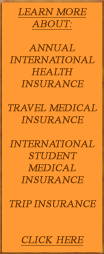Travel Medical and International Health Insurance for global travel, living and study.
 Open your U.S passport to page two and you may be surprised by the following warning:
Open your U.S passport to page two and you may be surprised by the following warning:
HEALTH INSURANCE. Persons considering foreign travel should determine what health insurance coverage, if any, they require while outside the United States. Medicare does not cover health care costs outside the United States and its territories, except under limited circumstances in Canada and Mexico.
 The simple fact is that many international travelers do not have appropriate insurance protection. Government sponsored health programs such as Medicare almost never cover care received in a foreign country. Employer-sponsored plans often limit overseas coverage to emergency care only (and the burden will be on you to prove it's an emergency). Emergency medical evacuation is almost never covered. Even if you're traveling on business, you may have significant gaps in your coverage.
The simple fact is that many international travelers do not have appropriate insurance protection. Government sponsored health programs such as Medicare almost never cover care received in a foreign country. Employer-sponsored plans often limit overseas coverage to emergency care only (and the burden will be on you to prove it's an emergency). Emergency medical evacuation is almost never covered. Even if you're traveling on business, you may have significant gaps in your coverage.
 Why is insurance so critical for international travel?
Why is insurance so critical for international travel?
Obtaining healthcare in some parts of the world can be tricky. Some hospitals won't provide any treatment--or won't allow a patient to be discharged--until the hospital has received a guarantee of payment. Such guarantees are commonly provided by travel insurers, in conjunction with assistance providers, but rarely by other insurers or managed care plans. This means you'll have to pay in advance, perhaps as much as tens of thousands of dollars, with your credit card. Of course, for this to work the hospital must accept foreign credit cards and your card must have a sufficient credit limit.
In addition, remember that leaving your destination--for a place with higher quality medical care or to return home where your regular insurance is accepted--can be difficult. Medical evacuations are tricky to arrange and there are some air ambulance providers who should be avoided. Worse, local authorities may have financial ties to certain evacuation companies. The solution? Most travel insurance includes a medical assistance benefit, which is critical. It gives you 24/7/365 access to a company that will arrange an evacuation for you with a creditable evacuation company--or, through their medical personnel, can help assure that you're getting appropriate treatment locally. The assistance company will also be available to help with other travel related problems such as legal troubles, lost passports or credit cards, etc. Emergencies are rare but everyone should have a contingency plan.
Assess your personal health plan:
If you have health insurance in the U.S., the first step is to check with your insurance company and establish what kind of coverage you have. If you have difficulty getting a straight answer, that alone should be a warning. If you don't have insurance in the U.S., consider that you might need it more than ever when traveling--and recognize that the coverage can be cheap -- as little as $1.50 to $4.00 per day.
Three Important Types
There are the three major types of coverage to consider. Most travel insurance products offer all three or two of the three:
- Health/accident insurance. Sometimes referred to as international health insurance, these policies pay for doctor and hospital bills, and sometimes dental care and medications. These plans can be written for short trips (1 day - 6 months) and will supplement Medicare or a managed care plan. HTH's TravelGap plans are an example of this type of coverage. International health insurance can also be purchased as primary insurance for someone relocating to another country for an extended period of time (6 months or longer). HTH's Global Citizen and Global Citizen EXP are examples of this type of coverage. These plans are comprehensive and include added features such as preventative services, acupuncture, chiropractic, maternity benefits and more.
- Medical Evacuation. This is key. Evacuations can be expensive (as much as $50,000 or more from a remote location). In addition to the coverage, you'll want assistance arranging an evacuation--(see above). All of HTH's products offer coverage for medical evacuation.
- Trip cancellation/interruption. These coverage's protect you financially in the event you have to cancel or interrupt your trip for medical or other reasons. For example, say you purchase a $5,000 cruise but can't take it because of personal illness--or illness in the family. Depending on when you cancel, a significant portion of the $5,000 may be non-refundable. This type of insurance will reimburse you. Obviously this protection is unnecessary for business travel. HTH's Trip Protector offers this type of coverage (as well as evacuation and supplemental health/accident).
One form of travel insurance commonly sold at airports is "flight accident insurance", which generally pays a lump dollar amount in the event of death from a plane crash, an extremely rare event. If you're looking at insurance in an airport, make sure it also includes one or more of the three important coverages listed above.
Here are some other key points about travel insurance, and a discussion about why insurance isn't enough:
- Multi-Trip vs. Single Trip Plans.Some plans cover a single trip (TravelGap Single Trip and TripProtector) and others cover all the trips you take during a year (TravelGap Multi-Trip). These Multi-Trip plans will generally put a limit on the duration of coverage during any one trip (usually about 30-70 days). If your trip exceeds that, you won't be covered at all, or won't be covered after the threshold day passes. So these plans aren't appropriate for extended travel, study or work abroad.
- Group plans are available. If you're traveling on business, there are probably others in your company who also travel internationally. If your company has foreign employees, they may travel to the U.S. on occasion for training and other purposes. Your company can buy group coverages for both of these situations. Contact your benefit administrator or HTH Worldwide (www.hthworldwide.com) and ask about HTH's Business Traveler International and Unicare Worldwide products.
- Secondary vs. Primary Coverage. Decide whether you need primary or secondary coverage. In the event of a medical claim or problem, primary coverage generally ignores your other insurance and pays the claim, if it's for a covered service. Secondary coverage sometimes requires that you first go to your primary plan (for example, Blue Cross) and request payment. If you have good primary health insurance, secondary coverage is probably adequate for most travel (it should be cheaper).
- Pre-Existing Conditions Exclusion. Many travel plans exclude pre-existing medical conditions (so-called Primary plans are more likely to do so--see above). This means that medical conditions that you have now or have had in the past (the definition varies) are not included in your coverage. Some of HTH's TravelGap products have no exclusion for pre-existing conditions. In addition, under HTH's TripProtector plan, the pre-Existing condition limitation is waived if coverage is purchased within 24 hours of making your final trip payment.
- Other Exclusions. Many policies will not cover accidents and injuries related to certain sports and activities viewed as high risk, such as skydiving. Even skiing and scuba diving coverage may be limited or require a higher premium. Many policies also exclude mental illness, and they won't cover you if you're traveling against the advice of a doctor or traveling for the purpose of seeking medical care. Read the policy to make sure it has the coverage you need.
- Deductibles and Co-Insurance. Like traditional medical insurance (that is, prior to HMOs), many travel insurance policies include these. A deductible is the fixed dollar amount you must pay before the insurance provides any reimbursement. Co-insurance is the percentage of the covered amount that you must pay. For example, if you purchase a plan with a $500 deductible and 20% coinsurance, then later submit a $1000 claim for a covered services, you pay the first $500 (the deductible) and 20% ($100) of the second $500. The insurance will pay $400.
- Remember: Insurance isn't enough. Your homeowners policy protects you from financial loss, but that's only partial consolation if your house burns down. That's why your town has a fire department, you install smoke detectors, you're careful not to leave candles burning unattended, etc.
 Same thing with Travel Insurance: buy it, but make sure you take other steps to prevent illness and injury when traveling:
Same thing with Travel Insurance: buy it, but make sure you take other steps to prevent illness and injury when traveling:
- Get appropriate vaccinations
- Follow other precautions necessary for your destination, such as food and water precautions.
- Learn something about the healthcare that's available in your destination, such as the names of preferred hospitals and the local emergency numbers (911 doesn't work all over the world!)
- Obtain the names of qualified, English-speaking doctors and other medical providers in your destination. The right diagnosis is usually the cheapest.
- Learn whether ambulances can be trusted to transport you in the event of emergencies. In some places it's safer and faster to take a cab!
- Learn about pharmacies in your destination--are they reliable and open at night? If you take medication regularly pack two supplies and place one in your carry-on luggage.
- Travel with a first-aid kit.
- Bring copies of key portions of your medical records--your EKG, for example.
HTH's Global Health and Safety Resources (included in all TravelGap and Trip Protector plans) provide a unique and valuable collection of tools to help you prepare for safe and healthy travel. -Written by Frank Gillingham, MD
Click here to visit HTH Worldwide's website and learn much more.
Travel Directory - Mexico, Europe, Canada and more - This travel directory offers up the top websites from Mexico, Florida, Canada, Australia, Europe, the Caribbean, Asia, Africa and around the world.
2727 Via Cascadita, Ste G - San Clemente, CA 92672 - (949) 226-8390

